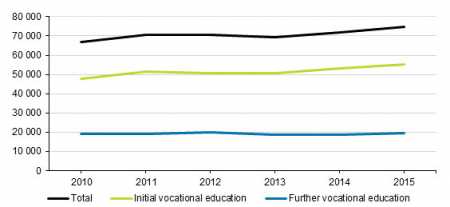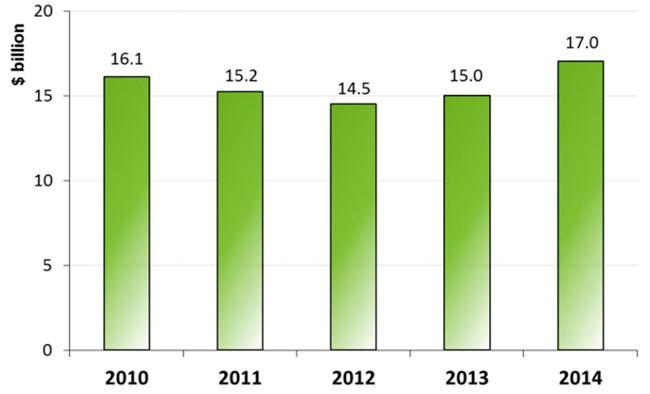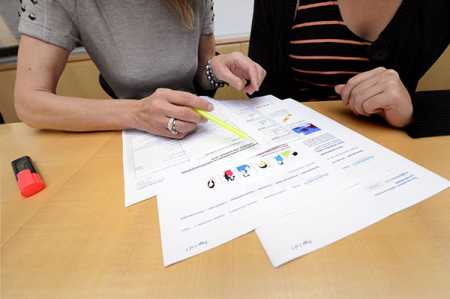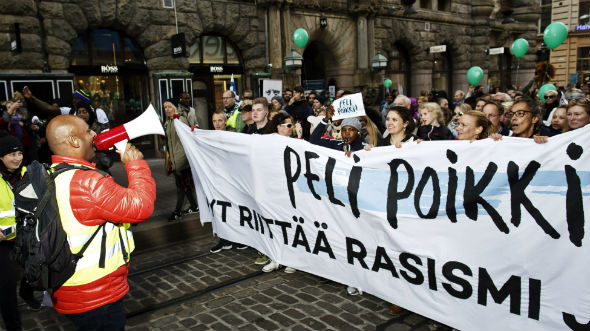Finlandia / 05 de octubre de 2016 / Fuente: http://www.finlandtimes.fi/
A total of 122,200 new students attended education leading to a vocational qualification in 2015, according to Statistics Finland’s education statistics.
There were one per cent more new students than in the previous year.
Of the new students, 48,400 studied in curriculum-based education aimed at young people leading to an initial vocational qualification, 36,300 in preparatory initial vocational education for a skills examination, and 37,500 in further vocational education the data show.
Thirty-eight per cent of the new students studied in the field of technology and transport, twenty per cent in the field of health, welfare and sports, and eighteen per cent in the field of business economics and administration.
The shares of men and women among the new students were almost equal.
The fluctuation in the shares of men and women viewed by fields of education was, however, large. In the field of health, welfare and sports, the share of women was 82 per cent and in the field of technology and transport it was 20 per cent.

Qualifications from vocational education 2010–2015. Source: Education. Statistics Finland.
In the calendar year 2015, a total of 325,100 persons were studying in vocational education leading to a qualification.
There were 167,000 students in curriculum-based basic vocational education provided by educational institutions in 2015.
Since 2013, data on the number of students in education for young people have been available both for the calendar year and for the autumn cross-sectional point on 20 September.
On 20 September 2015, there were 124,200 students in education for young people. There were four per cent less of them than in the previous year.
There were 109,000 students in preparatory education for a skills examination provided by educational institutions. There were seven per cent more students than in the year before. Of the students, 61,900 studied in preparatory initial vocational education for a skills examination, and 47,100 in further vocational education.
There were 49,100 students in apprenticeship training. The number of students was two per cent lower than in the year before.
Of the students, 500 studied in curriculum-based education aimed at young people leading to an initial vocational qualification, 17,900 in preparatory initial vocational education for a skills examination, and 30,700 in further vocational education as per the data.
Altogether, 74,600 students completed a vocational qualification in 2015. Curriculum-based basic vocational education qualifications numbered 37,800, examinations in preparatory initial vocational education for a skills examination totalled 17,400, and qualifications in further vocational education amounted to 19,400.
The number of attainers of vocational qualifications was four per cent higher than in the previous year. Fifty-three per cent of them were women.
More than half, 55 per cent, of those who attained qualifications studied in the fields of technology and transport, or in health, welfare and sports. Sixteen per cent of the qualifiers were apprenticeship students.
Fuente noticia: http://www.finlandtimes.fi/education/2016/09/28/30455/Number-of-new-students-in-vocational-education-slightly-ups-in-2015#prettyPhoto
Foto: https://www.google.co.ve/url?sa=i&rct=j&q=&esrc=s&source=images&cd=&cad=rja&uact=8&ved=0ahUKEwjdq9Gu5L_PAhUFJx4KHb0nDOIQjhwIBQ&url=http%3A%2F%2Fmonitor.icef.com%2F2015%2F08%2Faustralian-education-exports-reach-aus18-billion-in-201415%2F&psig=AFQjCNEPLUfiFNwYl459cD7HRYUnNj-D9Q&ust=1475623572522039

















 Users Today : 57
Users Today : 57 Total Users : 35460188
Total Users : 35460188 Views Today : 81
Views Today : 81 Total views : 3418864
Total views : 3418864